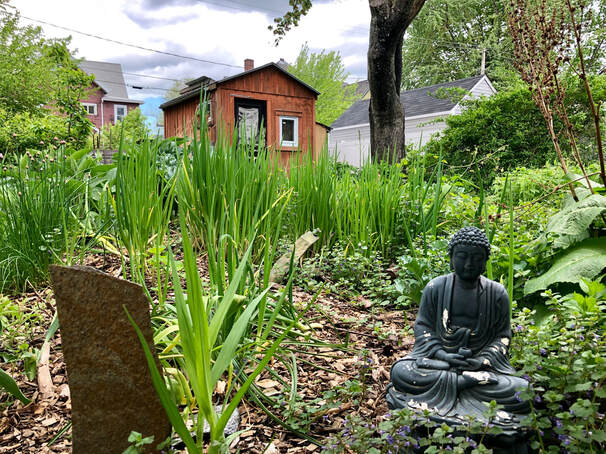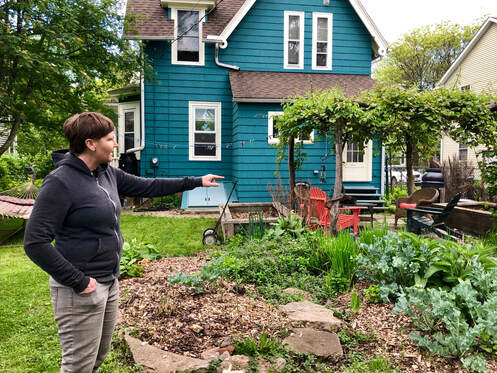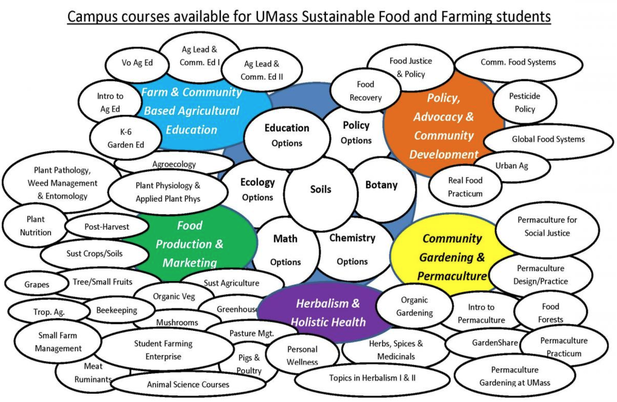University of Massachusetts’ Permaculture Programming

- Introduction to Permaculture. This class sees 40-50 students per year, whereas the other more advanced permaculture classes generally see an enrollment of between 12 and 20.
- Permaculture Design and Practice. This, combined with Introduction to Permaculture, results in students receiving a university affiliated Permaculture Design Certificate (PDC) issued through the Permaculture Institute of North America (where Lisa is a certified diplomat). In this course, among various aspects of permaculture design work, students engage in silvopasture with hybrid chestnuts and sheep on a 40 acre farm on campus.
- Forest Gardens and Perennial Agriculture. Last year, students in this class built a hügelkultur bed, made mushroom logs, studied and practiced polyculture design, and more.
- Social Permaculture. Of high interest to Lisa is how to use permaculture as a pedagogy for teaching. She co-creates a governance or culture for the class and students learn tools to help them critique inequities, goals for social change, and to analyze their own privilege and competencies in enacting change.
An advantage of students taking their Permaculture Design Certificate (PDC) in combination with a specialized degree, according to Lisa, is that they have can apply their new holistic lens of seeing the world to their major degree program, regardless of what program that is.
 What leads people like Lisa to teach permaculture at a major academic institution? Lisa grew up as a first generation Italian American with a strong culture around growing their own food. Through her family, “the seed was planted very early on with the culture part of permaculture.” But it was through school where Lisa was exposed to the planetary heartache resulting from our consumptive culture, and where she landed officially working in permaculture. “I went to school in West Virginia and I got really involved in activism against mountain top removal and got to travel to the southern coalfields in Appalachia and saw mountaintop mines from the inside. That just had a huge impact on me. I got to see miles and miles of what was a village and a community center just erased and all for cheap fossil fuel. Early on I also figured the connection between ecological health and social health through that activism work. The people that were living there were very poor. The coal company was such a strong force and economic employer in the region historically so people were afraid to speak out against them. The man that showed us, he was the only person who didn’t sell out to the coal company and he had this one homestead surrounded 360 degrees by mountaintop removal…he got death threats. We saw bullet holes that were shot in his door. [Before then,] I would just turn on a light, pump up the heat and just have no connection to how the way I was using fossil fuels impacted people and the planet…the veil was lifted.”
What leads people like Lisa to teach permaculture at a major academic institution? Lisa grew up as a first generation Italian American with a strong culture around growing their own food. Through her family, “the seed was planted very early on with the culture part of permaculture.” But it was through school where Lisa was exposed to the planetary heartache resulting from our consumptive culture, and where she landed officially working in permaculture. “I went to school in West Virginia and I got really involved in activism against mountain top removal and got to travel to the southern coalfields in Appalachia and saw mountaintop mines from the inside. That just had a huge impact on me. I got to see miles and miles of what was a village and a community center just erased and all for cheap fossil fuel. Early on I also figured the connection between ecological health and social health through that activism work. The people that were living there were very poor. The coal company was such a strong force and economic employer in the region historically so people were afraid to speak out against them. The man that showed us, he was the only person who didn’t sell out to the coal company and he had this one homestead surrounded 360 degrees by mountaintop removal…he got death threats. We saw bullet holes that were shot in his door. [Before then,] I would just turn on a light, pump up the heat and just have no connection to how the way I was using fossil fuels impacted people and the planet…the veil was lifted.”
As with other leaders in the permaculture movement, Lisa began protesting at International Monetary Fund and World Bank gatherings. And it was through protesting against militarized police force that she was turned to solutions-based work. “Here we were going out, fighting for the rights of small farmers to stay on their lands and not be undercut by cheap goods coming from the US and flooding the market and displacing them to sweatshops and cities, so we were fighting for global justice and at the same time being met with militarized force: tanks, tazors, rubber bullets, gases, riot gear…I started to think about ‘ok, the system really needs to change but when you try to change it through street protests, we are really going up against the largest military in the world that is treating its citizens like the enemy. So that was also a wake-up call of how difficult change could be made through those methods.”
While pursuing her M.S. from UMASS in Regional Planning, following an undergraduate degree in journalism, Lisa saw a flyer on a bulletin board for an Introduction to Permaculture weekend in the early 2000s. At this point, she became part of what at the time was a small community in the northeast interested in permaculture, engaging in perma-blitzing work parties, creating demonstration sites in yards and forming the Western Mass Permaculture Guild. She obtained a three-acre parcel and license to farm conservation land through working with the city and neighbors. Permaculture was still a hobby for her at that point, expressed through a no-till Community Supported Agriculture program and forest garden, serving 24 households at its peak. On the side, Lisa was picking up trash and recycling by bike and diverting a ton of vegetable scraps each week.
At that time Lisa also started teaching at Yestermorrow Design Build school, where they were just starting their permaculture programming. Lisa helped create the programs, including a certificate course in sustainable design.
Now, as a faculty member at UMASS, Lisa is adding credibility to permaculture through research. She is currently monitoring soil carbon sequestration through her UMASS Carbon Farming Initiative silvopasture research site. She is also conducting soil proxy tests with the Northeast Organic Farming Association (NOFA) to look at proxy indicators including the amount of worms, compaction, infiltration and more. From her website, this is “the first temperate climate research silvopasture plot at the University of Massachusetts. Carbon farming is the practice of sequestering carbon from the atmosphere into soil carbon stocks and above ground biomass. Silvopasture, a carbon farming practice is the intentional combination of trees and livestock for increased productivity and biosequestration.”
Outside of her university work, Lisa serves on a working group for the Massachusetts State Healthy Soils Initiative. She also teaches a women’s teacher training with Pandora Thomas. She sees permaculture as providing hope for our ability as human beings to be keystone species to bring about health and well-being. And she is thinking beyond the individual residential level to larger scales by asking questions like how to redesign her city “so the city has a methane
digester, and instead of the gas being fracked from upstate, we are producing that from our compost instead of it going to the landfill…that’s part of my training in regional planning.”
Although her permaculture programming is housed in Sustainable Food and Farming, Lisa feels “permaculture is so interdisciplinary that it could land in any department.” I asked whether she has received any pushback in teaching permaculture at a major academic institution, and she said “The only pushback is we are in a hard science program, and also being whole systems thinkers, we are thinking about the social. So we are having to prove more of the social forces that are part of science. [As a result], we are asked ‘is this rigorous enough? Is this scientific enough? Is this hard science?’” She is proving that permaculture is both hard science through her carbon farming work, but also social science through her pedagogical research.
When students walk away from her permaculture programming, Lisa hopes they have “a really clear understanding of systems thinking.” She also wants students to understand “design thinking. How you go from a problem to understanding existing conditions, articulating goals and outcomes. How to use the principals to design some options and take it forward. Both the solutions-oriented approach to what’s wrong and then an actual process they can take with them that they can then use to actually enact change.” Lisa’s hands-on research and teaching are breaking exciting new ground regarding the potential of permaculture in higher academia.
To discover more about Lisa and UMASS permaculture, visit: https://stockbridge.cns.umass.edu/lisa-depiano

Recent Posts

